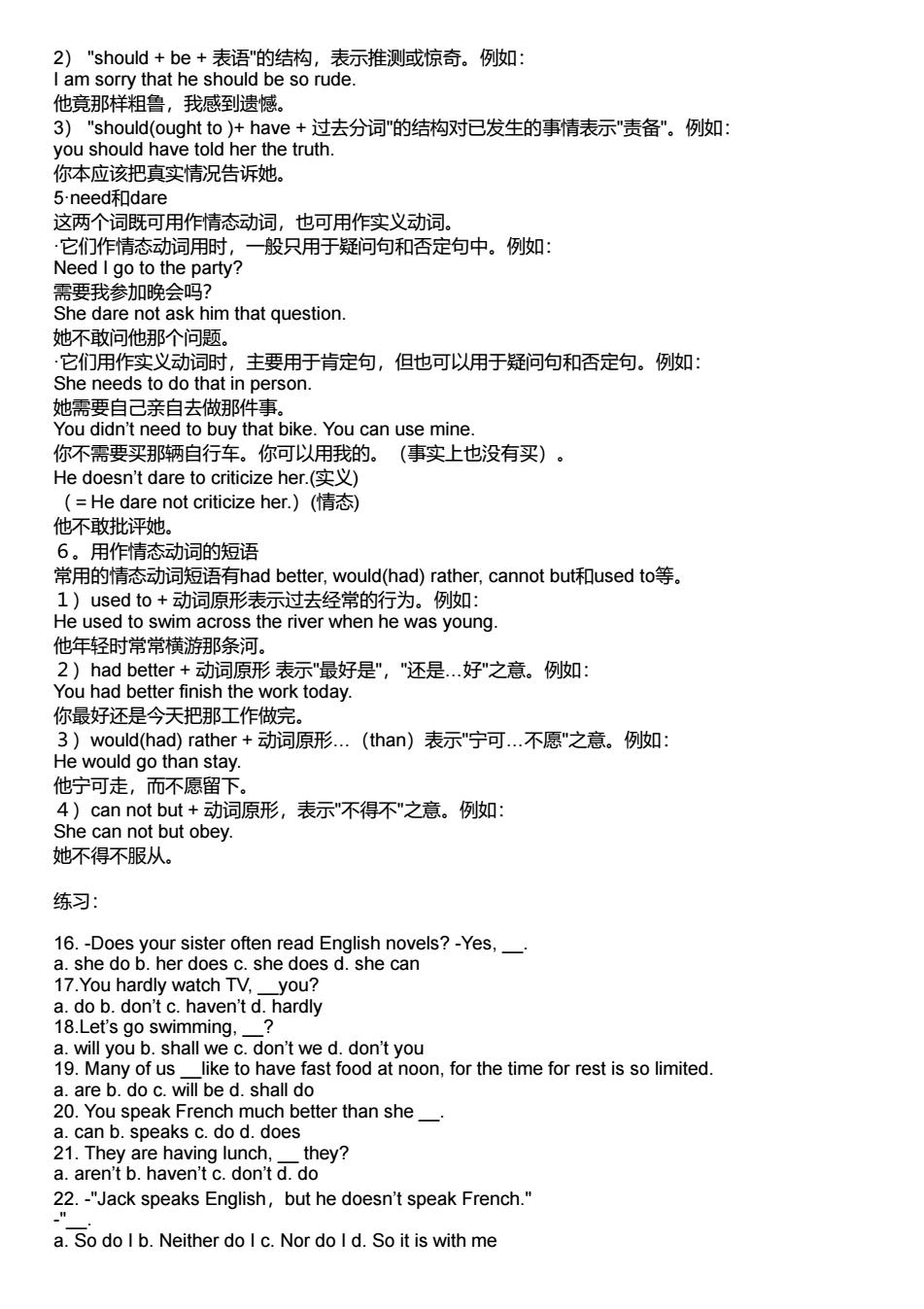正在加载图片...

2)"should+be+表语"的结构,表示推测域惊奇。例如: I am sorry that he should be so rude. 他境那样粗鲁,我感到遗憾。 "should(o ught to)+ha +过去分词"的结构对已发生的事情表示"责备”。例如 ud ha he 你本应该把真实情况告诉她。 5need和dare 这两个词既可用作情态动词,也可用作实义动词。 它们作情态动词用时, 一般只用于疑问句和否定句中。例如: Need I go to the party? 需要我参加晚会吗? She dare not ask him that question. 她不敢问他那个问题 它们用作实义 词时 主要用于肯定句,但也可以用于疑问句和否定句。例如 on 她需要 自己亲自 去做那 You did buy that bike. You can use mine 你不需要买那辆自行车。你可以用我的。(事实上也没有买)。 He doesn't dare to criticize her.(实义) (=He dare not criticize her.)(情态) 他不敢批评她 6。用作情态动词的短语 常用的情态动词短语有had better,would(had)rather,cannot but和used to等, 1)used to+动词原形表示过去经常的行为。例如: He used to swim across the river when he was young. 他年轻时常常横游那条河。 2)had better+动词原形表示"最好是","还是.好"之意。例如: You had better finish the work today. 你最好还是今天把那工作做完】 d(had)rath +动词原形.(than)表示"宁可不愿"之意。例如 他宁可走,而不愿留下。 4)can not but+动词原形,表示"不得不"之意。例如: She can not but obey. 她不得不服从。 练习: 16.-Does your sister often read English novels?-Yes, You hardly watch TV _you tc.haven't d hardly ing. 19.Man of us like to ha ave fast fo a.are b.do c.will be d.shall do 20.You speak French much better than she a.can b.speaks c.do d.does 21.They are having lunch, ey? a.aren't b.haven't c.don't d.do 22.-"Jack speaks English,but he doesn't speak French." a.So do I b.Neither do Ic.Nor do I d.So it is with me2) "should + be + 表语"的结构,表示推测或惊奇。例如: I am sorry that he should be so rude. 他竟那样粗鲁,我感到遗憾。 3) "should(ought to )+ have + 过去分词"的结构对已发生的事情表示"责备"。例如: you should have told her the truth. 你本应该把真实情况告诉她。 5·need和dare 这两个词既可用作情态动词,也可用作实义动词。 ·它们作情态动词用时,一般只用于疑问句和否定句中。例如: Need I go to the party? 需要我参加晚会吗? She dare not ask him that question. 她不敢问他那个问题。 ·它们用作实义动词时,主要用于肯定句,但也可以用于疑问句和否定句。例如: She needs to do that in person. 她需要自己亲自去做那件事。 You didn’t need to buy that bike. You can use mine. 你不需要买那辆自行车。你可以用我的。(事实上也没有买)。 He doesn’t dare to criticize her.(实义) (=He dare not criticize her.)(情态) 他不敢批评她。 6。用作情态动词的短语 常用的情态动词短语有had better, would(had) rather, cannot but和used to等。 1)used to + 动词原形表示过去经常的行为。例如: He used to swim across the river when he was young. 他年轻时常常横游那条河。 2)had better + 动词原形 表示"最好是","还是.好"之意。例如: You had better finish the work today. 你最好还是今天把那工作做完。 3)would(had) rather + 动词原形.(than)表示"宁可.不愿"之意。例如: He would go than stay. 他宁可走,而不愿留下。 4)can not but + 动词原形,表示"不得不"之意。例如: She can not but obey. 她不得不服从。 练习: 16. -Does your sister often read English novels? -Yes, _. a. she do b. her does c. she does d. she can 17.You hardly watch TV, _you? a. do b. don’t c. haven’t d. hardly 18.Let’s go swimming, _? a. will you b. shall we c. don’t we d. don’t you 19. Many of us _like to have fast food at noon, for the time for rest is so limited. a. are b. do c. will be d. shall do 20. You speak French much better than she _. a. can b. speaks c. do d. does 21. They are having lunch, _ they? a. aren’t b. haven’t c. don’t d. do 22. -"Jack speaks English,but he doesn’t speak French." -"_. a. So do I b. Neither do I c. Nor do I d. So it is with me